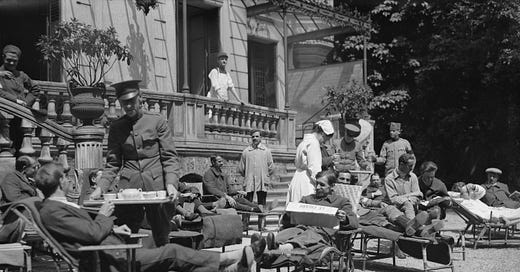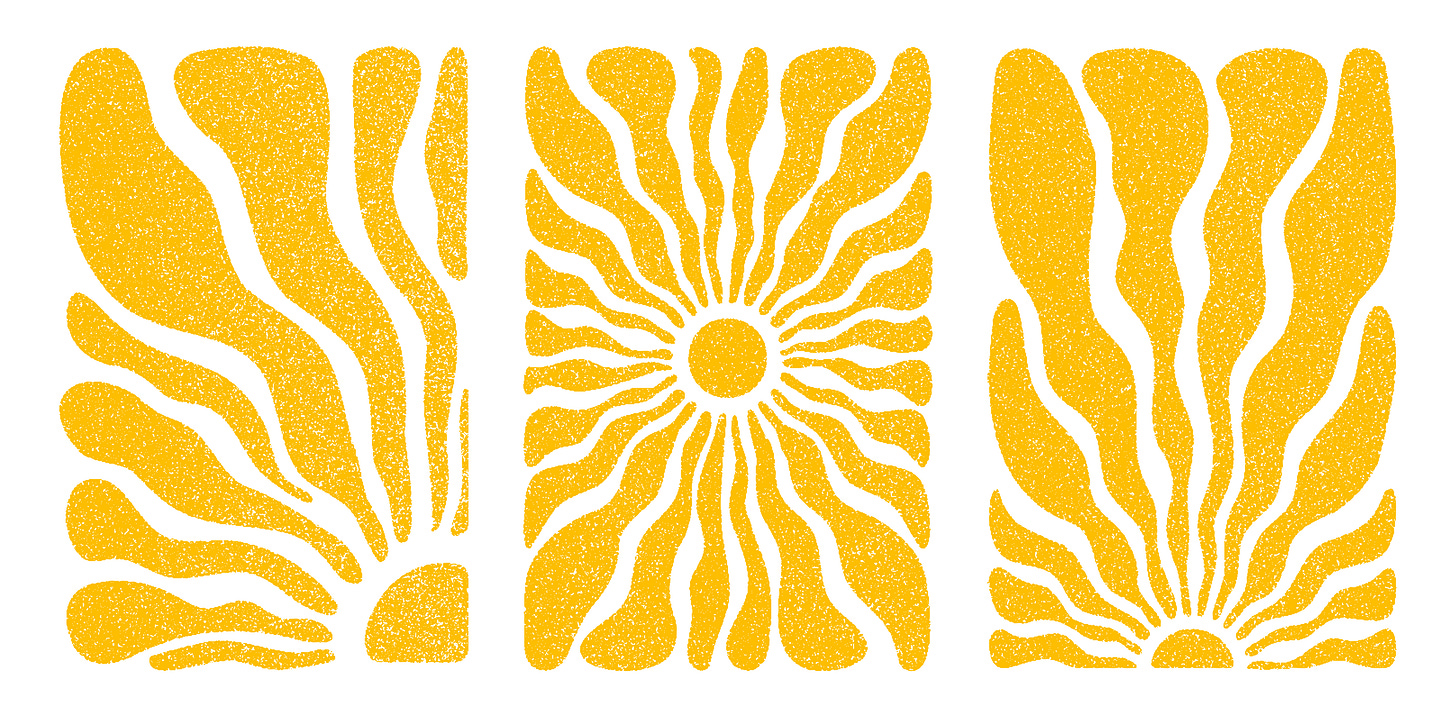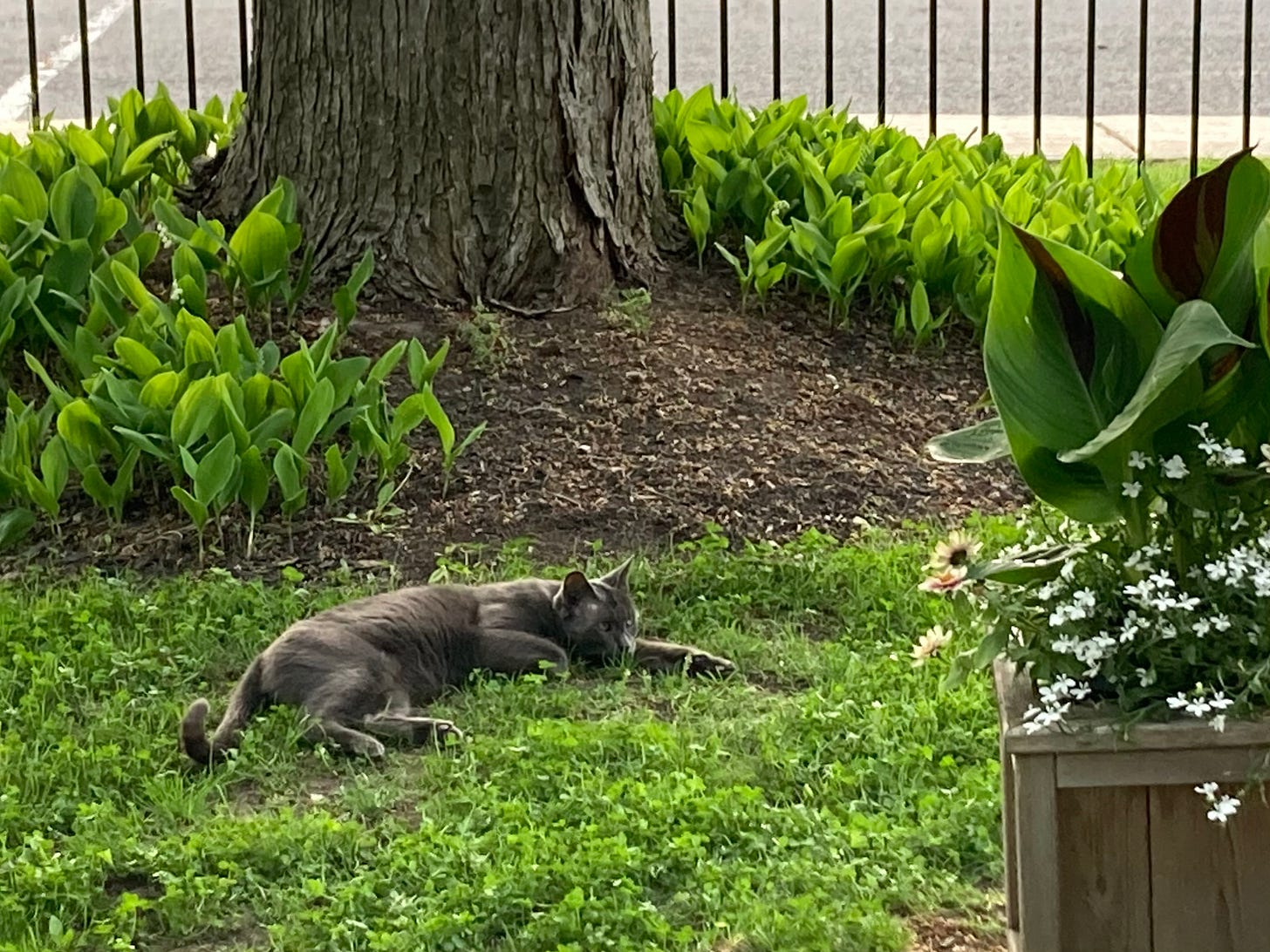Here comes the sun again
On ugly truths hauled into public view and the healing gift of sunlight.
There’s this tune I’ve loved since I first heard it. It’s by M. Ward, that California folk-blues artist with a weakness for saloon pianos:
Beyond the simple perfection of its melody is the imagery. Man, woman, nature, and machine rejoice in the sun’s return to the realm:
Kingdoms and queens they all bow down to you,
Branches and ranch hands are bowin' too
And I've taken off my straw hat for you, singing
Here comes the sun againAnd the leaves on the trees they all call out your name,
Chrome on the freight line shines the same
And the stars in their cars roll their tops down for you singing,
Here comes the sun again
The tune recalls the age-old archetype of the sun as the supreme source of life and order.
That archetype has pervaded our Western tradition since at least ancient Egypt, with its cult centred on the Sun God Re. There was a version in Mesopotamia too: Shamash brought life to the earth and justice to gods and man. Plato enlisted the sun in his Allegory of the Cave, presenting it as the “governor of every conceivable thing.” The sun’s light allows reason to perceive things as they are rather than as they appear, as shadows on a wall in the darkness.
The Best of Disinfectants
A more prosaic use of the sun image was made popular by Louis D. Brandeis, later a United States Supreme Court justice.
The year was 1913, the venue a Harper’s Weekly article, “What Publicity Can Do.” Brandeis was calling for legislation that would compel bankers to make public their commissions or profits when issuing securities. Publicizing the information, he argued, would return a degree of power to investors in a market where bankers functioned as middle men—and had amassed enormous wealth and power.
Thus Brandeis in 1913:
Publicity is justly commended as a remedy for social and industrial diseases. Sunlight is said to be the best of disinfectants; electric light the most efficient policeman.
His call for transparency blossomed into a movement, which eventually also prescribed sunlight for governments as a necessary step in ensuring accountability. From the 1960s on, it motivated a succession of reforms: access to information acts and information commissioners; recently, a global Open Government Partnership, Open Data Charter, and various Open by Default initiatives.
Before regaining power in 2015, the Liberal Party of Canada was a cheerleader for transparency. “Open and transparent government” was a key plank of its platform. A blog post prior to the election contrasted it to “the most centralized, self-serving government in Canadian history,” the Conservative government of the day:
Our plan will give Canadians a voice in Ottawa by ensuring more free votes and giving greater independence to parliamentary committees. Liberals will also make government information open by default to all Canadians, eliminate the fees associated with Access to Information requests, above the initial $5.00 filing fee, and ensure that the veil of secrecy over the Prime Minister’s Office is lifted.
Oh, the irony.
“Sunny ways”
That was Justin Trudeau’s promise in October 2015, at his election victory speech when he won his first and only majority.
Eight years on, in April 2023, a Globe and Mail opinion column would complain: “The Trudeau government was supposed to be ‘open by default.’ Open at all, ever, would be a nice start.”
This government has invoked Cabinet confidence on countless files. What little information it has shared has been pried open with the crowbars of legal necessity or negative public opinion. It took mighty efforts at information extraction to learn the nature of the “undue pressure” placed on the former Justice Minister in the 2018 SNC-Lavalin affair, for example; or the grounds for Cabinet’s invocation of the Emergencies Act in 2022; or “what Trudeau knew” in the 2024 public inquiry into the influence of foreign actors in federal elections—that same inquiry his government had fought tooth and nail to avoid for months.
And these were just the most damning missteps. Beyond them has been the systematic “coyness by default” on lapses in judgement and ethics. Had the Prime Minister and his wife really stayed at the $6,000/night river suite for the Queen’s funeral? Had he truly paid for that Christmas vacation in Jamaica out of pocket? Had the Prime Minister’s Office been the one that invited the Nazi to Parliament?
Wouldn’t we like to know.
The stomach turns as slivers of sunlight fall on crucial missing pieces. Recall the excruciating final days of the Public Order Emergency Commission, for example, when senior public servants unveiled the novel legal interpretation that Cabinet had used to invoke the Emergencies Act, despite the threshold set out in the act itself. The Prime Minister—Canada’s own Sun King?—declared himself “absolutely, absolutely serene” about his decision.
Or consider the latest exercise in wresting secrets from the centre: the Special Report on Foreign Interference in Canada’s Democratic Processes and Institutions released on June 3. From it, the Canadian public learned that a panel of five deputy ministers deemed it unnecessary to share intelligence about the integrity of Members of Parliament in selected ridings in the 2021 election. We learned details about the growing public social media surveillance apparatus now nestled at the heart of government. We saw that parliamentarians, staffers, and media actors—both “witting” and “unwitting”— collect information for foreign powers, and that our Prime Minister—who assures us constantly that he’ll do everything necessary to keep Canadians safe—has done everything in his power to avoid being briefed on it.
All of which is met with a shrug from Liberal Party representatives.
But hey, why not? As the indomitable Alex Brown put it so memorably, “What’s a Little Light Treason Among Friends?”
The First Step to Relief
Scratch any of the scandals—SNC-Lavalin, the Emergencies Act, the foreign interference file—and the information oozing out brings bile to the throat. More egregious still is the inaction of our national police in the face of it. Most egregious of all is the pleasure that this current governing crew and its handlers seems to take, both in avoiding repercussions and in gaslighting the rest of us that it’s all okay.
No one apologizes. No one resigns. No criminal charges are laid. Others, certainly, suffer from the actions or inaction of our government: those caught up in possibly the longest mischief trial in Canadian history, or in plea bargains reducing conspiracy to commit murder to weapons offences after two years of incarceration, or in being hauled to mysterious Chinese “police stations” operating on Canadian soil. Yet the offending parties skate on through, as “Open Government” adverts adorn the Government of Canada website to this day.
And for our part, the decent Canadian observers? Those rays of sunlight that made it through the crack in the Prime Minister’s Office door revealed something horrifying: the prospect that hostile foreign powers could already be steering our government.
And in face of that horror, it’s tempting to crumple—to say it’s over, we’re doomed. To turn away and tune out and let what emerged slip back into the darkness. That’s the danger.
But then they’ve got us.
So let’s lean into that sunlight instead. Let’s return briefly to Brandeis, after the first phase of his own war for transparency around the money trust. And let’s think of our own collective affliction in a similar way:
The battlefield has been surveyed and charted. The hostile forces have been located, counted and appraised. That was a necessary first step—and a long one—towards relief.
First sunlight hurts, then it heals.
What we learned is painful. But now, at least, we know—enough to know that our sovereignty and way of life depend on our learning more. Now we can think of the rot brought to light as the first step in the battle to pry open the door of a sick and mouldering room.
Now it’s time to pull back the curtains and fill that room with light. Now it’s time to do what we can—while we can—to name names and get our institutions back. And when we do, it will be because we fought for them. Because we insisted. Because we steeled ourselves for the ugly truth and demanded sunlight until it came.
In memoriam
To our cat Robbie—that legendary hunter, fighter, and sun-bather who lived his nine lives to the fullest and drew his last this past Monday.
Farewell, Rob. We’ll miss you sorely.







I am a sun worshipper. It has been many years since practicing: rising before dawn and heading down to Lake Ontario in all sorts of weather to watch as night was chased away by day and flocks of seagulls, geese, ducks, swans, and others flew in to join me on the beach. Sometimes a few humans were there as well. Together we would fill ourselves with the light that flamed across the sky and the water, and all that was followed by the appearance of a small red glow on the horizon. It was not only a beautiful sight to behold but also a profound spiritual cleansing. Thank you for sharing such a beautiful song. It reminds me of my youth when I hitchhiked across Canada chasing the experience which has kept me glowing as I live through my sunset years. This is right in line with my recent post on building a light grid.
My condolences. Robbie was awesome. May he hitch a chariot to our sun and tour the heavens in the name of peace and love.
I look forward to Chris Carbert and Tony Olienick basking in the sun as free men, and the disinfectant power burning off the loathesome scum who set them up for this travesty of injustice.
Bummer about your Cat, you honor him with this fantastic writing, Jodi.